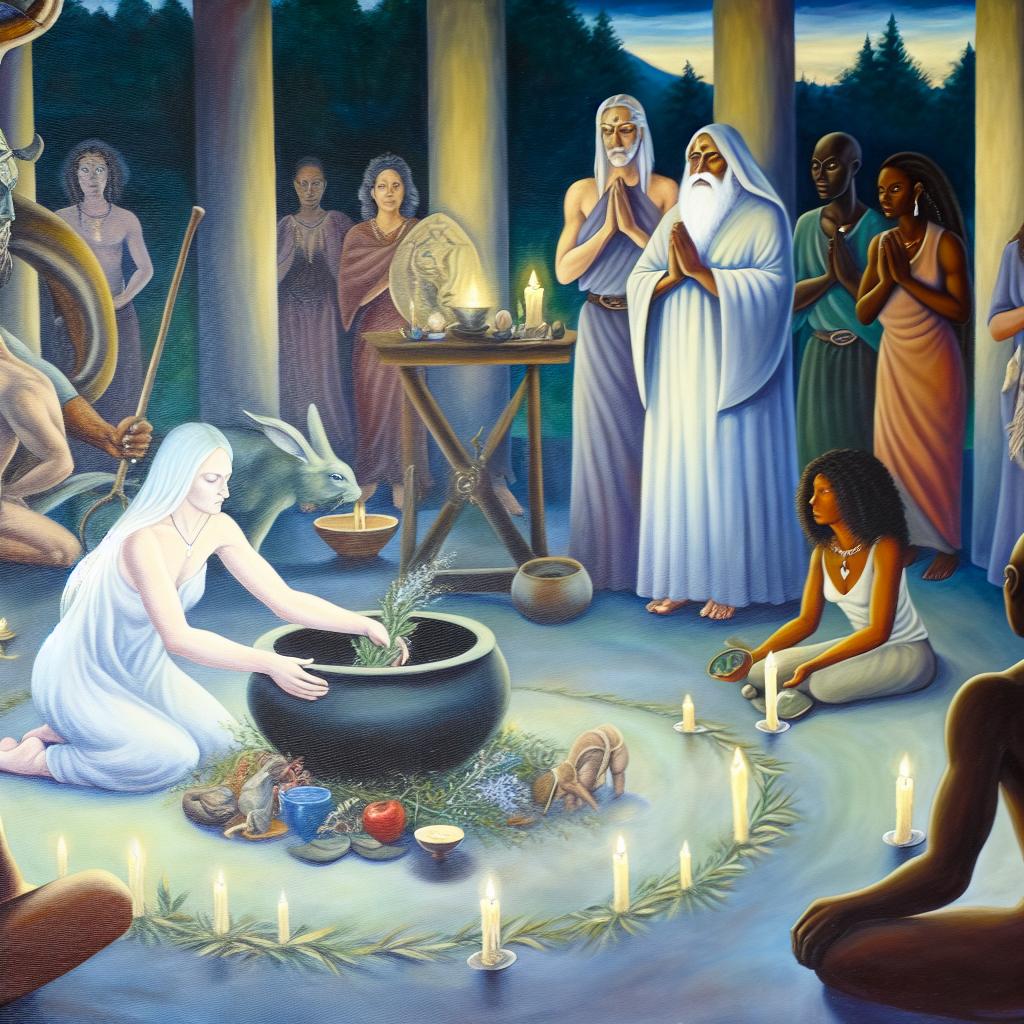
The Role of Deities in Wiccan Worship
Wicca is a modern pagan religion that focuses on the worship of nature and the reverence of deities. Central to Wiccan practice is the belief in a dual aspect of divinity, typically represented by a god and a goddess. These deities are often seen as reflecting the balance of natural forces and the interconnectedness of life.
Understanding Wiccan Deities
In Wicca, the deities are usually perceived as embodiments of natural phenomena and human experiences. The god is often identified with the sun, forests, and wild animals, while the goddess is associated with the moon, the earth, and fertility. Many Wiccans recognize these deities through various guises and names, drawing from a rich tapestry of mythologies from around the world.
The Perception of Divinity
Wiccans typically perceive divinity as both immanent and transcendent. This means that while the deities are beyond the physical world, they are also present within it and within the self. This belief fosters a personal and intimate relationship with the divine and emphasizes the sacredness of the natural world. By viewing divinity as immanent, Wiccans cultivate a connection that is deeply personal, finding sacred elements in the everyday experiences of life. This can manifest in the appreciation of a sunset, the growth of a plant, or the cycle of birth and renewal, all seen as reflections of divine power.
Ritual Practices
Rituals in Wiccan worship often involve invocations of the god and goddess. These practices are intended to honor the deities, celebrate seasonal changes, and manifest personal intentions. Many rituals occur during Sabbats or Esbats, which correspond to traditional pagan festivals and the lunar cycle. These ceremonies can include offerings, chants, and the casting of a circle to create sacred space.
The casting of a circle is a fundamental aspect of Wiccan ritual. It serves as a boundary that delineates the sacred space, setting it apart from the mundane world. Within this space, practitioners can focus their energy and intentions without interference. The process of casting may vary, involving the use of a wand, an athame (a ritual dagger), or simply the hand, as the practitioner visualizes the circle forming around them. Once the circle is cast, the gods and goddesses may be invoked, and the purpose of the ritual is declared.
Sabbats, marking the Wheel of the Year, include familiar festivals such as Samhain, Yule, and Beltane, each celebrating different aspects of the natural cycle. Samhain, often seen as the Wiccan New Year, is a time to honor the ancestors and reflect on the cycle of life and death. Yule, the winter solstice, symbolizes the rebirth of the sun and the promise of returning light. Beltane, celebrated at the height of spring, is a festival of fertility and life.
The Diversity of Deities
While some Wiccans follow a specific pantheon, others choose to work with a variety of deities from different cultural backgrounds. This eclectic approach allows practitioners to connect with figures that resonate personally, representing universal archetypes or energies that aid them in spiritual growth and understanding. Such diversity enriches the Wiccan practice, providing a wide spectrum of divine aspects to explore and engage with.
The choice of deities can be highly personal, often reflecting the practitioner’s unique journey and soul-searching. A Wiccan might feel drawn to the Celtic Brigid for her associations with healing and poetry or to the Egyptian Isis, who embodies the mysteries of life and death. The Greek goddess Hecate, with her attributes of magic and the crossroads, may appeal to those at significant junctures in life.
Wiccans may also embrace deities who do not fit into the traditional binary of god and goddess. Some practitioners acknowledge non-binary or gender-fluid aspects of divinity, an understanding that aligns with modern interpretations of gender. In doing so, they reflect the expansive and inclusive nature of the divine.
For those interested in learning more about Wiccan practices and beliefs, resources can be found through reputable organizations and authors dedicated to the teachings of Wicca. Consider exploring websites that offer educational content and books by established practitioners to deepen your understanding of Wiccan worship.
While Wicca is often practiced individually or in small covens, it emphasizes community and the sharing of knowledge. Many Wiccans value the contributions of figures such as Gerald Gardner and Doreen Valiente, who were instrumental in the development of Wicca in the 20th century. Their writings, along with those of more contemporary authors, provide valuable insights into the practice and philosophy of Wicca.
In conclusion, the role of deities in Wiccan worship is multifaceted and deeply intertwined with the natural world and personal experience. Whether through structured ritual or spontaneous devotion, Wiccans seek to live in harmony with the divine forces represented by their chosen deities. Guided by the rhythms of nature and the wisdom of myth, they find meaning and purpose in their spiritual journey.
